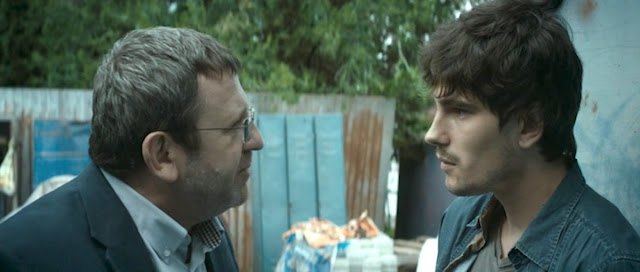THE
TRIAL
A film by Orson Welles
Based on Kafka's novel The Trial
1962/ France | West Germany | Italy / 119 minutes
12th Nov 2017/ 5.45 pm / Perks Mini Theater
A film by Orson Welles
Based on Kafka's novel The Trial
1962/ France | West Germany | Italy / 119 minutes
12th Nov 2017/ 5.45 pm / Perks Mini Theater
A
unique cinematic experience.
Orson
Welles ("Citizen Kane"/"Touch of Evil") in a defensive
manner has said that "The Trial' is the finest film I have ever
made." This is a loose adaptation of the Franz Kafka novel, published
posthumously in 1925. The Trial takes place in an unnamed hostile country.
Anthony Perkins is an excellent choice to play the Jewish bureaucrat clerk
Joseph K, a man arrested in his bare apartment early in the morning by two
heavy-handed fascist-type of policeman and not told what crime he is charged
with as he's brought to trial.
Filled
with a sense of guilt, a constant twitch, a nervous manner of speaking and
hiding his fear through repression of being exposed as some kind of sexual
deviant, the bland but ambitious office clerk Joseph K takes no comfort as he's defended by the
tyrannical Advocate (Orson Welles), who offers him no reason to believe his
case will be resolved in a positive way. Never told what he's charged with, the
innocent man begins to doubt even his innocence, as he's mentally tortured by
trying to recall what he might have done to deserve this fate.
Smartly
filmed in vast dark empty spaces, cluttered interiors, war-torn exteriors,
chilling lobbies and arcades, which are turned into Freudian dreamscapes of the
unconscious. The sinister
inhuman/baroque/surreal look is the look everywhere in the film, including in
Joseph K's office workplace (which can be compared to the horrors of a cold
American workplace).
As the trial pushes
on, K becomes involved with three sexually intriguing women -- Jeanne Moreau
(his next door neighbor prostitute), Romy Schneider (mistress of the Advocate),
and Elsa Martinelli (a cleaning lady in the law courts) -- who all serve as
bitter reminders of how he has been persecuted all his life.
The
film is brilliantly lit on the dark side, much like a film noir, pouring over
with critical thoughts about the individual, society, and art. Though not for
all all tastes, those who stay with this one will be richly rewarded with a
unique cinematic experience. Welles is a great filmmaker, who is an excellent
guide into a Kafkaesque nightmare. (Thanks
to Dennis Schwartz)
Orson Welles
Hollywood Rebel & Founding Member of The Society of
Independent Motion Picture Producers
Though little appreciated in his time,
Orson Welles is today one of classic Hollywood's most acclaimed cinematic
visionaries Always an outsider to the studio system which dominated filmmaking
at the time however, Welles never condescended to play by Hollywood's rules and
his arduous four-decade career was pocked with moments of brilliance, excess
and waste.
George Orson Welles (May 6, 1915 – October 10, 1985) was
an Academy Award-winning American director, writer, actor and producer for
film, stage, radio and television. Welles first gained wide notoriety for his
October 30, 1938, radio broadcast of H. G. Wells' The War of the Worlds.
Adapted to sound like a contemporary news broadcast, it caused a number of
listeners to panic. In 1941, he co-wrote, directed, produced and starred in
Citizen Kane, often chosen in polls of film critics as the greatest film ever
made. And in 1941, at 26, he achieved his greatest ambition through formation
of his own Mercury Productions, Inc. The rest of his career was often
obstructed by lack of funds, incompetent studio interference and other unfortunate
occurrences, both during exile in Europe and brief returns to Hollywood.
Despite these difficulties Othello won the 1952 Grand Prix du Festival
International du Film at the Cannes Film Festival and Touch of Evil won the top
prize at the Brussels World Fair, while Welles himself considered The Trial and
Chimes at Midnight to be the best of his efforts.
Although Welles remained on the margins of the major
studios as a director/producer, his large



































